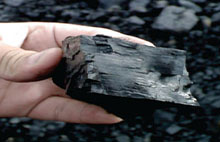
Chinese coal contracts settle flat for 2020

The producers mine a range of thermal and coking coals, including low-sulphur coking coal and equivalent grades of low-volatile premium hard coking coal.
Downstream consumers were unhappy with the outcome, with most of them having expected a price drop of at least 50-100 yuan/t ($7.10-14.20/t), said attendees of the contract negotiations and signing ceremony held in Nanning, Guangxi province, over the past week.
"Production at domestic mines this year has been generally stable and high, and spot prices have fallen by a total of about Yn50-70/t, particularly over the second half of 2019," a Beijing-based coal trader, who was in attendance, said. "So most buyers were expecting that to carry over to contract prices."
But another participant at the ceremony stressed that contract prices will be reviewed again during the first quarter of 2020, as that is when the full impact of enhanced safety checks is expected to become clearer.
Two coal mine accidents have occurred this week alone, one in Shanxi province and the other in Shandong province. Market participants expect the government to tighten safety checks, in response to these incidents. No mines have so far been ordered to halt production, preventing any significant effect on supply. For this reason, coal producers prefer to fix the price at a later date.
"Some special arrangements exist," a Singapore-based trader said. "Although the contract prices are kept stable on paper some preferential discounts may be extended to buyers, for instance, when they buy a minimum volume of coal from a certain producer," the trader said. So, some customers may already be getting unofficial price drops in contracts.
Should the domestic contract prices hold at current levels, Chinese steel and coke producers could increasingly turn to imports of coking coal next year, especially with seaborne prices at a three-year low, last assessed at $143.75/t cfr China. Domestic low-sulphur coking coal prices are currently about $30-40/t higher.
This might offer some hope to international coal producers, amid continuing weak expectations for the steel markets in Europe, India, Japan and South Korea. Many ex-China steel producers are heard to have trimmed their long-term contract volumes with major producers as their margins get increasingly squeezed and more attention is paid to costs.
By Rou Urn Lee


Trump weighs using $2 billion in CHIPS Act funding for critical minerals

Codelco cuts 2025 copper forecast after El Teniente mine collapse

Electra converts debt, launches $30M raise to jumpstart stalled cobalt refinery

Barrick’s Reko Diq in line for $410M ADB backing

Abcourt readies Sleeping Giant mill to pour first gold since 2014

Nevada army depot to serve as base for first US strategic minerals stockpile

SQM boosts lithium supply plans as prices flick higher

Viridis unveils 200Mt initial reserve for Brazil rare earth project

Tailings could meet much of US critical mineral demand – study

Kyrgyzstan kicks off underground gold mining at Kumtor

Kyrgyzstan kicks off underground gold mining at Kumtor

KoBold Metals granted lithium exploration rights in Congo

Freeport Indonesia to wrap up Gresik plant repairs by early September

Energy Fuels soars on Vulcan Elements partnership

Northern Dynasty sticks to proposal in battle to lift Pebble mine veto

Giustra-backed mining firm teams up with informal miners in Colombia

Critical Metals signs agreement to supply rare earth to US government-funded facility

China extends rare earth controls to imported material

Galan Lithium proceeds with $13M financing for Argentina project

Kyrgyzstan kicks off underground gold mining at Kumtor

Freeport Indonesia to wrap up Gresik plant repairs by early September

Energy Fuels soars on Vulcan Elements partnership

Northern Dynasty sticks to proposal in battle to lift Pebble mine veto

Giustra-backed mining firm teams up with informal miners in Colombia

Critical Metals signs agreement to supply rare earth to US government-funded facility

China extends rare earth controls to imported material

Galan Lithium proceeds with $13M financing for Argentina project

Silver price touches $39 as market weighs rate cut outlook

















